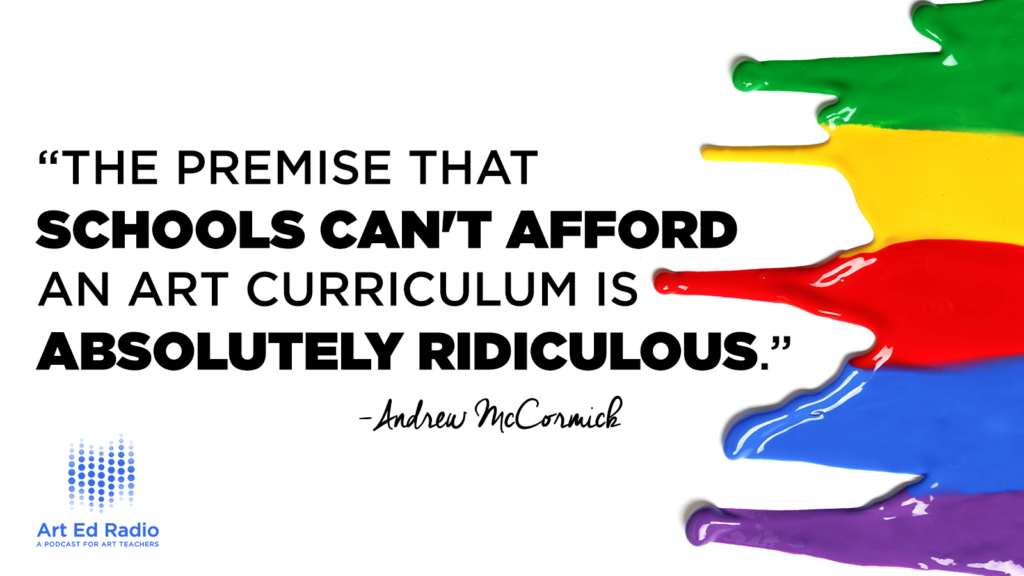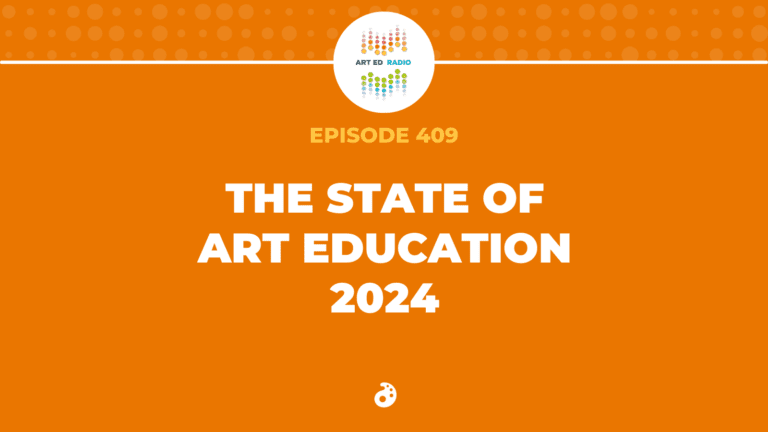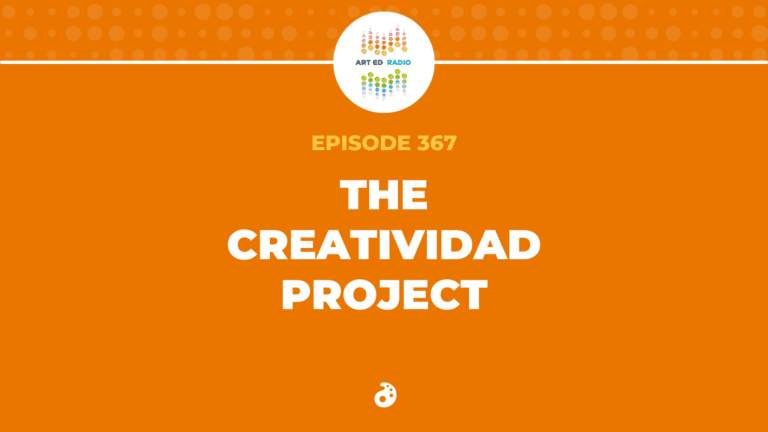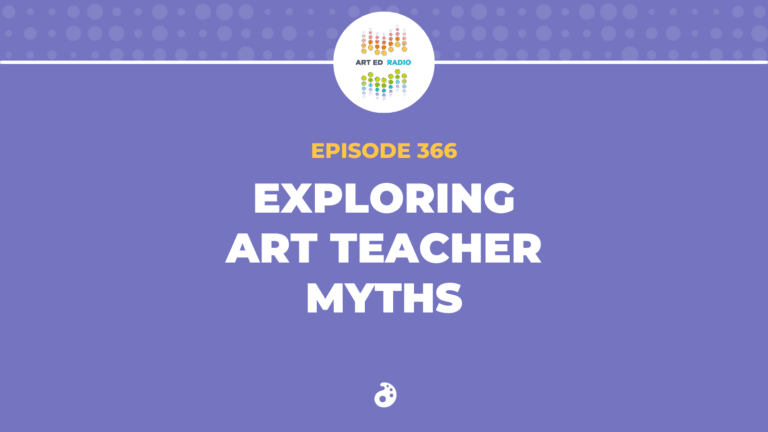If you’ve been on art teacher social media any time in the past week or so, you have probably seen this article. Art teachers everywhere were offended by its assumptions, its ideas about the role of art teaching, and its conclusions about the future. In this special episode, Tim and Andrew offer their takes on the article (3:15), the role of art teachers and the arts (8:30), and the controversy found in the resulting social media firestorm (12:30). Full episode transcript below.
Resources and Links:
- The offending School Specialty Article
- If we’re talking budgets, how about the old “Budget Like a Boss!” podcast?
- How to Make the Arts a Valued Part of Your Community
- A few more great resources for advocacy

Transcript
Welcome to Art Ed Radio, the podcast for art teachers. This show is produced by the Art of Education, and I’m your host, Tim Bogatz.
Oh, School Specialty. What have you done? If you’ve spent any time on art teacher social media in the last week or so, you’ve probably seen the firestorm caused by a post on the School Specialty blog. It’s called After School Art Education for Students Without Options. It starts fairly and honestly enough, talking about some of the best parts of what an arts education brings students, and why schools should and do what they can to save their art programs when they’re in a budget crunch. But quickly thereafter, the post takes a turn for the worse, suggesting that schools who don’t have the budget might want to offer art classes after school, or even turn art into an extracurricular. Then, and this is the part where almost all art teachers take their biggest exception with the post, the author makes a suggestion that non-certified art teachers could start teaching art, or volunteer artists, and schools could pay those people what they pay coaches. Specifically, much less than an art teachwe would make.
While I understand some of the ideas here, most importantly that the arts are worth saving no matter what kind of budget struggles you may have, the biggest ideas presented are the ones that cause the most problems, and devalue the arts and art teachers specifically the most. Taking art out of the school day, giving classes to only a select few students, or having non-certified teachers as instructors are all non-starters, and because of that, art teachers, like I said, are feeling devalued and disrespected. The resulting firestorm on the blog itself and on social media have been something to behold. There is a great discussion happening there, and I wanted to talk about some of the ideas presented, and some of the ideas that are posted, and people’s reactions, with Andrew.
I’m going to bring him on right now to talk about the blog post, the social media reaction, and how we’re both feeling about the ideas presented and the pushback that’s come from them. Let’s get the conversation started.
All right, Andrew. Thank you for coming on. How are you?
Andrew: I’m doing great, man. Thank you for having me.
Tim: All right. Well, I am glad you’re here, because we have a social media firestorm to talk about.
Andrew: Whoa, buddy.
Tim: I know you love social media, and I know you love drama, so I assume that you have read the School Specialty post about making art into an extracurricular. You’ve read this, correct?
Andrew: I did. To be honest, the first time I read it, I did not actually read it. I read just people’s comments. I was like, “I don’t know if I need to dig into this.” Then I did again, and yup. I’ve read the original post, and plenty of comments about it. Yeah.
Tim: To summarize here, it starts off pretty positively, with, “Research proves that art education increases social skills, betters the school community, et cetera, et cetera.” Really nice. Then all of a sudden it talks about budgets being cut, art maybe not being a core subject, and schools that are starting to make art into an extracurricular. Then they come up with all of these ideas of bringing in volunteer artists, and non-accredited teachers to start teaching these after-school art classes. Yeah. Let me ask you this, with all that put together, where are your big problems with this article?
Andrew: Well, to be fair to the company, they did add a big sort of multi-paragraph, bold, sort of like disclaimer at the beginning, that was not run with the first entry or the first post. I think that was in response to all the sort of negative publicity and firestorm that they created. I mean, I kind of get that, that redaction, but yet when you read the original post, there’s just some really bizarre sort of like jumps. And like you said, it’s like, “Hey, art’s really important. Hey, arts are being cut, so hey, anybody can do this.” It’s like, “Wait, wait, wait, wait, wait. Your jump from step two to step three should not have been, ‘Hey, anyone can teach this.’ It should have been like, ‘Hey, we should all be super upset and fight for the legitimacy and the place for arts in the schools.’ Not, ‘Let’s all agree that this is okay and find any old person to teach this thing.'”
One of the things that I think the writer of the article should have said is … Well, let me back up. I actually don’t have a problem with the idea of art clubs or art enrichment activities being run like a sport. I actually think that that’s kind of a cool idea. Like, “Hey, you have a football team. You have a tennis team. Here’s your art team, or your art club.” Okay. That’s a great add-on, but not in lieu of a guaranteed and viable art curriculum.
Tim: Yeah. It’s not a great replacement.
Andrew: Right. The base expectation should be that all students have a good art curriculum run by a certified and legitimate, license-holding art teacher that’s providing a real experience, not, “We’re going to do this after school stuff that’s taught by some community people that may or may not be good, and you may or may not …” I mean, it just … No. We have to fight for some guaranteed, viable, baseline expectations before we can jump into, “Hey, we can just replace art teachers with anybody in the community.” What? I’ve been doing this a lot. It’s like, can you imagine that article being written about math, or science, or a STEM education? “Hey, STEM’s really expensive, but just forget it. Screw Project Lead the Way. You can just have volunteers come in and do that.” That article, and the person that writes that article would be just ridiculed for being ridiculous, but in the arts, it’s kind of okay to have that belief I guess.
Tim: Yeah, and I think that’s the frustrating thing, and I think that’s what art teachers pay attention to. That’s what they harp on the most. Just that feeling of disrespect, where if you sit down and think about this, you say to yourself, “Oh, why would somebody write this?” But if it were about math, or science, or English, the thought would have never crossed anyone’s mind to even propose this article, to even start this article. I think it just kind of gets at that feeling of disrespect. I think that’s where a lot of the frustration comes from.
I want to kind of circle back around to something you said, where they put out a second statement from the School Specialty CEO about, “This article is not indicative of how we think. Did not convey the message we wanted.” Which I absolutely applaud them for doing that, because they very easily could have gotten rid of the post and all the comments completely. They could have deleted the article and just retracted it, but I really appreciate the fact that they’re still leaving it up there for people to read. They’re still kind of standing behind what’s there to keep that discussion going. If we do want to keep that discussion going, let me ask you this. I guess kind of the premise of the article, whether it’s written well or not, the premise or the idea is that if school budgets have been cut to the point where art is no longer an option, funding is no longer available, are these after-school art classes beneficial? Like, is something better than nothing? Obviously in an ideal world, art is a core subject. Every student is being taught art by a certified art teacher, but in the current reality, that is not happening everywhere. That being said, would some of the ideas proposed here with after-school classes or extracurriculars, is that better than nothing?
Andrew: I see what you’re trying to do here. You’re trying to play devil’s advocate a little bit, and make me look at nuance. I’ll gladly do that, but at the same time, I also want to strongly say that I kind of want to reject your premise. I want to reject the fact that we have to accept, as art teachers, that our budgets are getting cut. Well, why? Why is it that an art curriculum is deemed too expensive and frivolous, but a Project Lead the Way curriculum, or a new football stadium, or cheerleading uniforms are not? I think I can agree with you and say, like, “Yes, of course. Something is better than nothing.” But at the same time, I think as art teachers, it’s important that we still fight, that this whole premise that schools can’t afford art education programs is kind of ridiculous and needs to be examined. If anything, I would say schools can’t afford not to have an art curriculum. If we really, as school districts, believe what we say about creativity, and partner for the 21st century skills, the art curriculum and the art teachers are the people where you get the most bang for your buck with those classes. Stop saying you believe these things and then not funding them, you know?
I don’t know. I do worry with some of these after-school sort of replacement or subsidiary type things, you don’t know the quality that’s happening, and that’s not to say that quality can’t happen, but I also worry about … Okay, let’s say you have a large school district. Graduating class size of 500 students, let’s say. You can’t tell me that an after-school curriculum or an after-school program run by volunteers from the community or other teachers who are not trained to do this, out of the goodness of their heart, are going to be able to meet the needs of all of these students. Then it gets to, “Well, how do we meet all of their needs? Is it a paid program? Do people have to pay for it?” Which then only exacerbates sort of the financial disparities between kids that come from means and don’t come from means. That’s not the intent of what education is supposed to be about. Education is supposed to be about providing opportunities for all kids, not just the kids who have the know, and the wherewithal, and the means to get that extracurricular after-school stuff.
Tim: Yeah. I couldn’t say it any better than that, and I think, yeah, that’s the biggest point we need to make. Why are arts programs, why are our arts budgets negotiable? They should not be. It is a core subject. It needs to be taught everywhere to every kid. I don’t think that we can or that we should accept the fact that we can be on the chopping block. It shouldn’t be like that.
I do want to talk a little bit, too, about sort of the social media rejection of this article, the hundreds of comments that you’re seeing on the article itself, on Facebook, on Twitter. All kinds of social media. I’ll ask you a couple of questions, but first one, as an art teacher, are you offended by this post? I see that in so many people’s comments. Like, “I’m so offended that you would think this way, that you would write this way.” You personally, are you offended as an art teacher that something like this would be put out?
Andrew: I’m a little offended, and I’m definitely not shocked or surprised, though, right?
Tim: Right.
Andrew: Because I think that this article is just capturing sort of the general society’s thoughts about art education and how it is a nice thing to have, but not a necessity. But I am a little offended. I think more than anything, I guess I’m a little bit confused. I would think that a company that caters to art teachers would have a more sympathetic sort of approach, and I guess I’m surprised that it made it out. I’m not surprised that it was written, and like I said, I kind of agree with sort of some of the sentiments, which is, “Wouldn’t it be great if art clubs could be run like extracurricular sports teams?” That’s a cool idea. But then some of the other stuff, it’s like, “Wow, No one caught that, or thought to think that that’s a little insensitive to your base, and to creativity?” I guess I’m more perplexed and confused than offended, but I’m a little offended.
Tim: Yeah. I think that was just sort of my reaction, too. I was just kind of exasperated when I read that. I mean, my feelings aren’t hurt, but I’m just kind of puzzled. Like, “How is this out there? Why would a company that specializes in school supplies and art supplies put out something like this?” Yeah. It obviously was not thought through.
Andrew: Well, I don’t mean to be a conspiracy theorist, but I have been watching a lot of Nicholas Cage movies lately. National Treasure one and two. I wonder if some of this is like, if they’re following the money? If they actually think that there’s more money to be earned and gained by branching out their scope, and saying like, “Wow, look at the environment that we have, and how many schools are cutting their art programs. Let’s try to recapture some of that.” Then I think this article moves away from being offending or confusing, and it’s just kind of sad now. It’s sad that this is like the state of where we’re at, that this company feels like the best way for them to cash in is to actually cater to alternative art education programs. It’s just like, “Ugh, it’s kind of sad now.”
Tim: Yeah. I guess that kind of segues into my next question as well, where maybe they are … This is coming out because it’s more profit-driven. But I feel like they are going to lose a lot of business from art teachers. My next question for you, then, is, would this be something that would cause you to not order from this company anymore? Because you read through all of these comments, and this is where the firestorm comes from, where so many teachers are saying, “You’ve lost my business. I’m going to this other company. I’m going somewhere else to order my supplies.” Is that something that you would consider as a teacher? To say, “I’m not going to order from these guys anymore”?
Andrew: Well, it’s really tricky, because it’s really nice and quaint to say that your morals and your values would steer your money elsewhere, but when you don’t have a lot of money, if School Specialty is still some of the best prices or bargains you have, it’s kind of hard to eat your values, and take your money elsewhere, so I don’t know. Sometimes I kind of let my wallet, my checkbook, or my school’s checkbook speak for me, but sometimes it’s like, we know that the reality is tough, and I’m going to go with places that have the best deals. What I would say as an art teacher is, if you do business with this company, I’m not above saying, “Hey, you all just wrote this craptastic article. You used to give me a 10% discount. How about we make that 20%, because I’m hot as hell right now.” I would actually use it to my advantage. “You want to keep my business? You better do right by me.”
Tim: Yeah. I think that’s a pretty good idea, actually. I think personally, it’s easy to get fired up on social media, and say “I’m never doing business with this company again.” But it’s really hard to look your kids in the eye and say, “Oh, we don’t have that material this year, because I got upset about somebody writing these three paragraphs.” I don’t know. I think it’s something that you need to reflect on. I’m not going to give kudos or judgment to anybody for going one way or the other, but I think it is something that you need to think about.
Andrew: Yeah.
Tim: Cool. All right, well I think that’s going to wrap it up for us, but yeah. It’s always good to talk drama and talk social media firestorms, so thanks for coming on.
Andrew: Yeah. My pleasure, man.
Tim: That will wrap it up for this special episode of Art Ed Radio. Thank you, as always, for tuning in. We would love to hear from you as part of this conversation, so reach out and let us know your opinion, or let us know about maybe a part of the discussion that you think we may have missed. You can always reach us at RadioGuys@TheArtofEd.com.
Now, I think it’s always good to talk about these kinds of issues when they come up, because we, as art teachers, are always sensitive to these issues. We see so many people lose jobs just right and left because of administrators, or boards of education, or budget cuts. When a company, particularly one who works so closely with art teachers, posts something insensitive like this, it can really get you riled up emotionally. I think we need to kind of join in the discussion and help hash out your feelings, so I hope this episode has helped, and I hope we can move on fairly quickly, and get back to the important work that we do: Teaching our students, during the school day, as certified teachers. Thanks for listening.
Art Ed Radio is produced by the Art of Education, with audio engineering from Michael Crocker. Remember that you can sign up for our email list at ArtEdRadio.com. Thanks for tuning in to this special episode, and we will be back next Tuesday with our regular weekly show. Talk to you then.
Magazine articles and podcasts are opinions of professional education contributors and do not necessarily represent the position of the Art of Education University (AOEU) or its academic offerings. Contributors use terms in the way they are most often talked about in the scope of their educational experiences.



